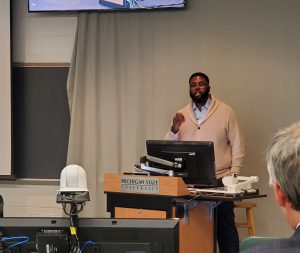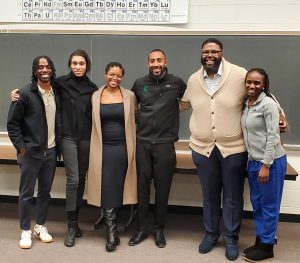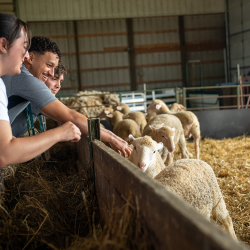As the academic world continues to journey toward equity, that work includes examining student experiences—past and present—to determine if current policies are serving them best. In the spirit of that effort the MSU Health Colleges invited the MSU community to the Revisiting the Beloved Community event on January 18, 2024.

What is it that universities are missing when it comes to the academic success of some students and academic struggles of others? Dr. Anthony Jack, invited as the event speaker, explored the experiences of students at elite colleges to shine light on this question.
The event—sponsored by the MSU Health Colleges and Office of Health Sciences, including the College of Veterinary Medicine—was part of MSU’s week of Martin Luther King commemorative events. The event recording is available here.
Jack, a sociologist, author, and faculty director of the Newbury Center at Boston University, spoke from his personal experience as a first-generation college student from a disadvantaged background who attended Amherst College, as well as from the research that went into his book The Privileged Poor: How Elite Colleges Are Failing Disadvantaged Students.
Jack spoke about the ways universities can be unaware of how students’ backgrounds prior to college can affect how they move in an academic environment when universities inadvertently prioritize students with institutional knowledge.
DVM Student on the Ground
Students from each of the Health Colleges participated as emcees and facilitators of the event. Isabella Tillman, DVM class of 2027, assisted with the question and answer segment. She was motivated to participate in the event as a student representative because of her desire to open doors for other veterinary students from underrepresented backgrounds as well as because she saw parts of her own educational history in Jack’s story.
“I view my entry into veterinary education as something my alma mater helped prepare me for, but something that was certainly not handed to me,” says Tillman. “Dr. Jack’s talk did not make me view my entry into veterinary education in a different way, but it highlighted the importance of effectively supporting undergraduates without familial/traditional ties to the field in their efforts to enter it.”
Jack oriented portions of his talk around medical education, since the event was sponsored by MSU Health Colleges, and he noted that health professions, such as human medicine and veterinary medicine, often favor those who have parents in the same field.
Additionally, he discussed the importance of rest and how it felt like “a luxury he could not afford” during his studies because he had to work harder and was busier than his privileged peers. Veterinary medical education is considered notoriously difficult and stressful with plenty of late hours studying and clinic work.
“I am a bit older than many of my peers, and I feel that life experience helps me keep my priorities in check and fit in rest when needed. If I’d entered this program with the same mentality I had as an undergraduate, I am quite certain that I would not be able to say that,” reflects Tillman. “In the future, I hope to protect the space for rest by remembering that I can’t achieve my goals in the classroom without prioritizing my nutrition, sleep, and mental and physical health goals outside of it.

“I feel the College has an opportunity to support this for all students by maximizing our class and lab schedule’s efficiency, cutting out undue breaks between classes, and making sure our schedule is oriented to help us seize the day whenever we’re on campus,” adds Tillman.
University support for students was a central pillar of Jack’s advice. He emphasized that once the disparity between students from different backgrounds is brought to light, universities must work to determine what support for different types of students will create a more equitable environment.
Making College Home
Until those changes are implemented, Jack encouraged students to reach out for the help they need, if possible. He stated, “College is your home, dare to demand as much of MSU as it demands of you.”
Tillman is doing her best to implement this advice. “I am already in the process of demanding some things from MSU in that I am applying the small elite liberal arts college mentality to the great big institution that is Michigan State!”
She says, “I’ve met with nearly all of my equine-oriented professors to ‘pick their brains’ on how they’ve structured their careers and learn from them about the equine veterinary industry and more. This, in essence, is what Dr. Jack communicates in The Privileged Poor: the proactive engagement with the university that all students should feel comfortable doing and entitled to do at their institutions. He also challenges us to be vocal in sounding alarms and insistent regarding the necessity of change when we see instances of wrongness, injustice, or unequal access playing out at our schools, none of which I am or will be shy about doing.”
Tillman’s efforts represent a body of students working hard to make universities more equitable places — efforts which universities will hopefully continue to rise to meet in the perpetual labor toward equity and inclusion.



